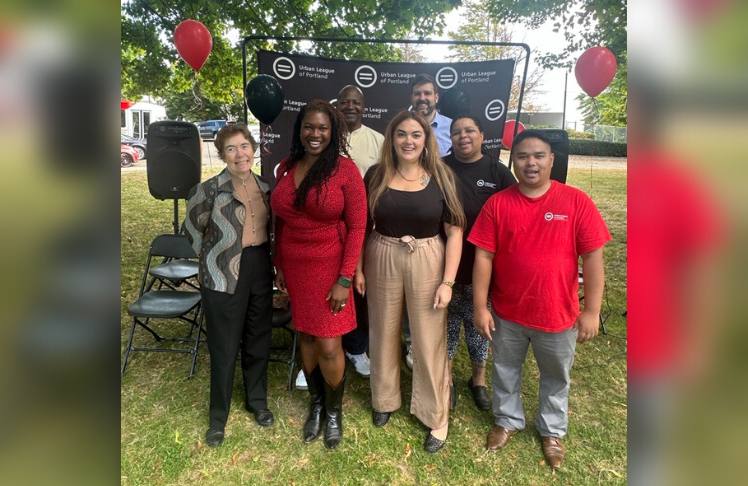
By Aneesa Grant, The Portland Medium
Last week, the Urban League of Portland celebrated the third anniversary of their groundbreaking Jamii Center program. Jamii, which means “community” in Swahili, is not your typical homeless shelter; it’s a transitional housing shelter located in North Portland. The center is the first motel-based shelter in the region specifically tailored for the African American community.
The Urban League initiated this trauma-informed program during the height of the COVID-19 emergency, opening its doors in October 2020. Fast forward to today, and it remains the sole motel-based shelter of its kind in the region and one of the few in the nation.
“The Jamii Center program is like none other,” said Urban League President Nkenge Harmon Johnson, Esq. “While some call it a homeless shelter, we call it transitional housing. We give community members a place from where they can launch into homes of their own. They move on with jobs, better health, and the continued support they need to stay safe and off the streets.”
Affectionately known as “The Jamii,” this center provides more than just shelter. It offers nutritious meals, flexible stays, and a supportive environment. Instead of adopting a one-size-fits-all policy, the Urban League collaborates closely with each resident, tailoring resources to their individual needs, creating a personalized path to stable housing. Resident Advocates assist program participants in gathering crucial documents like birth certificates and Social Security numbers, guiding them toward stable housing, employment, and other life goals.
“The bottom line is that the Jamii is one part of the Urban League housing program through which our experienced staff assist community members to move off the streets and into permanent housing,” explained Harmon Johnson. “During the past year through this program, we helped more than 120 people move off the streets of Portland.”
In its inaugural year, the Jamii Center welcomed 78 Portlanders who were at high risk due to COVID-19. Remarkably, even during the ongoing pandemic, 40% of those residents transitioned into permanent homes within four months.
The Jamii Center is equipped with laundry facilities and storage units for residents, ensuring a comfortable stay. The Urban League goes the extra mile, offering peer support and a comprehensive range of health, education, and employment services. Residents are encouraged to participate in civic engagement and financial empowerment programs to advocate for themselves effectively.
The Jamii Center’s services include vital components such as resident health services, dental and vision clinics, prescription renewal assistance, aging, disability, and mental health support, veterans’ services, and public transportation access.
“We are glad to offer residents a robust schedule of activities that includes game- and movie nights, crafts, and gardening,” said Kimberly Bacon, Manager of the Jamii Center. “We celebrate holidays and birthdays along with personal achievements such as sobriety milestones.”
The Jamii Center stays true to its Swahili namesake—community. There are ample opportunities for residents to build connections and celebrate life together. Bacon adds, “We also prioritize working with small- and Black-owned businesses to provide meals for residents.”
The Urban League’s investment of local and federal resources, including pandemic emergency funding, brought this innovative transitional homeless shelter to life. As the three-year lease on the motel site in North Portland draws to a close, the Urban League is collaborating with Multnomah County officials to secure a motel, ensuring the continued operation and expansion of the successful Jamii Center.
“We had to fight for the resources to build our unique approach to moving Portlanders off the street to help them survive the pandemic, but we didn’t stop with a short-term intervention,” says Harmon Johnson. “As we celebrate the third year of this transitional housing shelter, and the program participants who are now living in homes of their own, it’s clear that our Jamii Center is a winning model for fighting homelessness. We look forward to helping many more people in years to come.”















